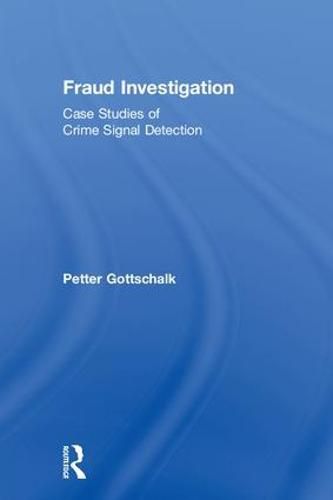Readings Newsletter
Become a Readings Member to make your shopping experience even easier.
Sign in or sign up for free!
You’re not far away from qualifying for FREE standard shipping within Australia
You’ve qualified for FREE standard shipping within Australia
The cart is loading…






Investigating white-collar crime is like any other investigation concerned with past events. However, a number of characteristics require a contingent approach to these investigations. This book describes the process of conducting private internal investigations by fraud examiners and presents a number of reports from the United States, Sweden and Norway.
It evaluates a number of internal investigation reports to reflect on the practice of fraud examinations. Empirical studies provide a basis to reflect theoretically on practice improvements for fraud examiners. Rather than presenting normative recommendations based on ideal or stereotype situations so often found in existing books, this book develops guidelines based on empirical study of current practice.
Internal investigations should uncover the truth about misconduct or crime without damaging the reputation of innocent employees. Typical elements of an inquiry include collection and examination of written and recorded evidence, interviews with suspects and witnesses, data in computer systems, and network forensics. Internal inquiries may take many forms, depending upon the nature of the conduct at issue and the scope of the investigation. There should be recognition at the outset of any investigation that certain materials prepared during the course of the investigation may eventually be subject to disclosure to law enforcement authorities or other third parties. The entire investigation should be conducted with an eye towards preparing a final report.
As evidenced in this book, private fraud examiners take on complicated roles in private internal investigations and often fail in their struggle to reconstruct the past in objective ways characterized by integrity and accountability.
$9.00 standard shipping within Australia
FREE standard shipping within Australia for orders over $100.00
Express & International shipping calculated at checkout
Investigating white-collar crime is like any other investigation concerned with past events. However, a number of characteristics require a contingent approach to these investigations. This book describes the process of conducting private internal investigations by fraud examiners and presents a number of reports from the United States, Sweden and Norway.
It evaluates a number of internal investigation reports to reflect on the practice of fraud examinations. Empirical studies provide a basis to reflect theoretically on practice improvements for fraud examiners. Rather than presenting normative recommendations based on ideal or stereotype situations so often found in existing books, this book develops guidelines based on empirical study of current practice.
Internal investigations should uncover the truth about misconduct or crime without damaging the reputation of innocent employees. Typical elements of an inquiry include collection and examination of written and recorded evidence, interviews with suspects and witnesses, data in computer systems, and network forensics. Internal inquiries may take many forms, depending upon the nature of the conduct at issue and the scope of the investigation. There should be recognition at the outset of any investigation that certain materials prepared during the course of the investigation may eventually be subject to disclosure to law enforcement authorities or other third parties. The entire investigation should be conducted with an eye towards preparing a final report.
As evidenced in this book, private fraud examiners take on complicated roles in private internal investigations and often fail in their struggle to reconstruct the past in objective ways characterized by integrity and accountability.